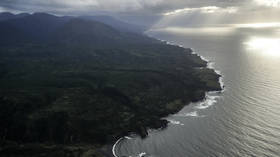Japan whipping up ‘hysteria’ in WWII row with Russia – Moscow

Japanese politicians are spending far too much time bickering in a decades-long row with Russia over a chain of Pacific Ocean islands that Tokyo has laid claim to since the end of WWII, and would do better to spend the energy on improving relations instead, Moscow has said.
Speaking as part of an appearance on the Soloviev Live YouTube channel on Tuesday, Russian Foreign Ministry spokeswoman Maria Zakharova poured scorn on Tokyo’s stance on the Kuril Islands, which Japan considers as its sovereign territory but has been governed from Moscow since 1945.
“To me, it seems that the Japanese leadership allocates all of its time that could be spent on building normal, fully fledged economic, financial and cultural ties with our country… to fixate on this issue,” she said, accusing officials of whipping up “artificial hysteria and tension.”
According to Zakharova, this frenzy does not just appear randomly and is “being fueled” by “a certain part of the Japanese political establishment.”
She also said that the row benefits Washington by helping “to keep this issue afloat because it prevents the Japanese side from pursuing full-scale, mutually beneficial and promising cooperation with” Russia.
Her remarks come shortly after Washington’s new ambassador in Tokyo, Rahm Emanuel, accused Moscow of disrespecting the territorial integrity of other states, as well as the Asian nation’s. “Russia's disregard for the sovereignties of others is also not new, nor is it limited to the Northern Territories,” he said.
The four islands, which are known as the Northern Territories by Tokyo, were occupied by Soviet forces before the end of WWII. Moscow insists the USSR was promised the land by its allies at the Yalta Conference in exchange for entering the war against Japan, subsequently formalized in the San Francisco Treaty, signed in 1951.
However, Tokyo has since claimed that the southernmost islands in the archipelago were not included in this agreement. Moscow says that their sovereignty is not up for debate, instead insisting that it wants to resolve the issue and sign a formal peace treaty, which Japan has so far rejected.
The two nations have attempted to reach a solution over the islands for over half a century without success.













